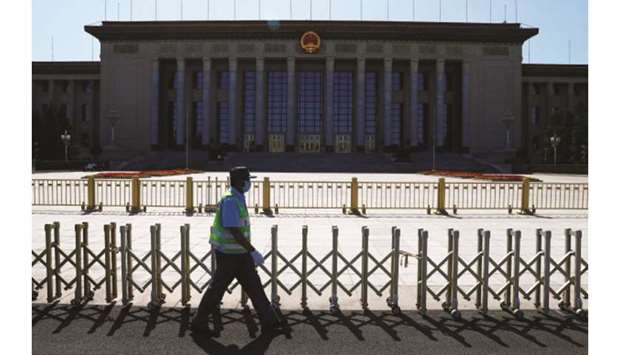After a 78-day delay, China’s parliament begins its annual session this week and is expected to unveil stimulus measures to spur an economy battered by the coronavirus as leaders grapple with problems from surging unemployment to worsening US ties.
The National People’s Congress (NPC) will open on Friday in Beijing’s stately Great Hall of the People in the clearest sign yet that life is returning to normal after the coronavirus.
But President Xi Jinping faces unprecedented challenges with his long-term economic goals under threat and an urgent need to revive growth and fend off big job losses that could threaten stability.
All eyes at the opening will be on Premier Li Keqiang’s 2020 work report, when he is expected to offer clues on whether and how Beijing will target growth for the world’s second-largest economy and fiscal stimulus plans. China’s economy shrank 6.8% in January-March from a year earlier, the first decline in decades.
The politburo, a top decision-making body of the ruling Communist Party, has pledged to raise the annual budget deficit ratio, issue more local government special bonds, and what would be the first special treasury bonds since 2007, in order to help spur growth, but few details have been made public. Li is expected to announce a growth target substantially lower than the roughly 6% originally set.
Government think-tanks and advisers have proposed lowering the target to 2-3%, or around 3%, or simply not announcing one due to the global economic gloom.
“This year’s NPC is quite unusual,” said Zhao Xijun, deputy dean of the School of Finance and Economics at Renmin University.
“More concerns will be on the anti-virus work and how to revive economic activity, and through what measures.”
The largely rubber-stamp parliament is also expected to pass the first civil code, wide-ranging legislation that, among other things, will formalise property and personal rights as part of Xi’s plan to reform the legal system.
The civil code also sends the message that the Communist Party wants to give more protection to a private sector that has long been vulnerable to bureaucratic and administrative abuses, on top of difficulties over access to markets and bank credit.
To minimise virus infection risk, the 3,000 delegates from across China are expected to practice social distancing and shun contact with outsiders, according to state media.
That means attendees who usually gather cheek by jowl in row upon row in the assembly may have to attend some meetings via video link.
Diplomats hoping to observe sessions must check into a state guesthouse the night before and be tested for the coronavirus, some told Reuters. While China remains wary of a second wave of infections, Xi is likely to be lauded for leading the “war against the virus” and achieving “decisive results”, according to language in a summary of last week’s politburo meeting.
“Leaders and delegates will likely also discuss the next step in epidemic control, how to prevent a second wave, and how to address the problem of Western countries asking for probes and compensation,” said Tang Renwu, dean of Beijing Normal University school of public administration.
Government economists expect fiscal stimulus measures to be announced amounting to 5tn to 6ton yuan, or 5%-6% of gross domestic product (GDP), along with more policy easing by the central bank.
China has already taken a raft of steps, including cuts in interest rates and bank reserve requirements, more fiscal spending, tax breaks and subsidies, but its stimulus has been dwarfed by that of other countries.
But even with more stimulus, Xi may find it hard to fulfil the party’s long-term goal of doubling GDP and incomes in the decade from to 2020.

A security guard walks past the Great Hall of the People, the venue of the upcoming People’s National Congress (NPC) in Beijing, China.
